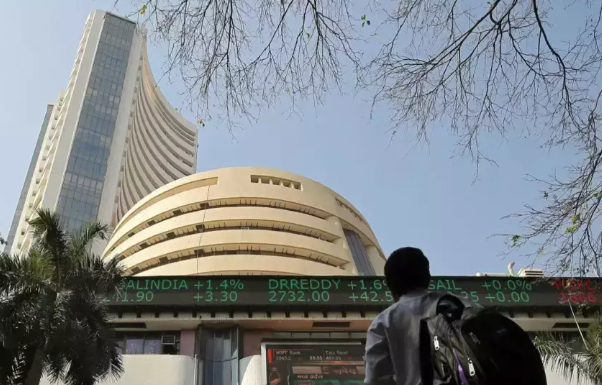
Sensex Plummets by Over 600 Points; Nifty Dips Below 21,300 Mark
Sensex Plummets 600 Points, Nifty Sinks to 21,274, Unleashing Financial Turmoil
The chaos unfolded swiftly on Dalal Street as the Bombay Stock Exchange (BSE) flagship index, the Sensex, spiraled downwards by a staggering 600 points during afternoon trading on Thursday. This tumultuous descent followed an initial opening in the red earlier in the day, marking a day of significant volatility in the financial markets.
As per the most recent data available from the BSE at 12:29 pm, the Sensex had plummeted by 588.71 points to reach 70,471, a sharp decline occurring just minutes after the index had already experienced a drop of over 600 points. The magnitude of this decline sent shockwaves through the investment community and heightened concerns about the stability of the market.
Amidst this downturn, ten out of the thirteen major sectors registered losses, with particular focus on the information technology (IT) sector, which saw a notable slide of 1.5% during afternoon trading. Analysts and market observers closely monitored these developments, providing insights and perspectives on the unfolding situation.
Aishvarya Dadheech, the founder and chief investment officer at Fident Asset Management, shared her perspective on the prevailing weakness in the IT sector, stating that it is likely to persist in the near term. She indicated that a significant factor contributing to this trend is the anticipated delay in the recovery of client spending and earnings growth within the sector, suggesting that it could take as long as two to three quarters for a meaningful Sensex revival.
The implications of such a significant downturn in the financial markets reverberated across various segments of the economy, prompting investors and stakeholders to reassess their strategies and positions. The sharp decline in stock prices, particularly within the IT sector, underscored broader concerns about economic uncertainties and the pace of recovery in the aftermath of recent global events and geopolitical tensions.
As market participants grappled with the rapid fluctuations and uncertainties, analysts cautioned against overreacting to short-term volatility and emphasized the importance of maintaining a long-term perspective in investment decisions. While the immediate outlook appeared turbulent, seasoned investors viewed such downturns as potential opportunities to identify undervalued assets and deploy strategies aimed at mitigating risks and maximizing returns over the long run.
The dynamics of the financial markets, influenced by a myriad of factors ranging from macroeconomic indicators to geopolitical developments, underscored the inherent unpredictability and volatility inherent in investment activities. Against this backdrop, market participants remained vigilant, continuously monitoring developments and adjusting their strategies in response to evolving conditions.
The events unfolding on Dalal Street served as a stark reminder of the inherent risks associated with investing in the stock market and the importance of adopting a disciplined Sensex approach to managing portfolios. Amidst the flurry of market activity and fluctuations in asset prices, maintaining a diversified portfolio and adhering to sound investment principles emerged as critical strategies for navigating through periods of uncertainty and volatility.
While the immediate focus remained on the Sensex unfolding developments within the financial markets, analysts and investors alike contemplated the broader implications for the economy and the trajectory of recovery in the post-pandemic landscape. The resilience of businesses, the effectiveness of policy responses, and the evolving consumer behavior emerged as key determinants shaping the outlook for economic growth and market performance in the coming quarters.
The sharp decline in the Sensex by over 600 points during afternoon trading underscored the volatility and uncertainties prevailing in the financial markets. While the immediate impact reverberated across various sectors, seasoned investors viewed such downturns as opportunities to identify value and position themselves strategically for the long term. Amidst the flux of market activity, maintaining a disciplined approach to investment and staying abreast of evolving developments remained paramount in navigating through turbulent times.
For the latest updates-click here.


